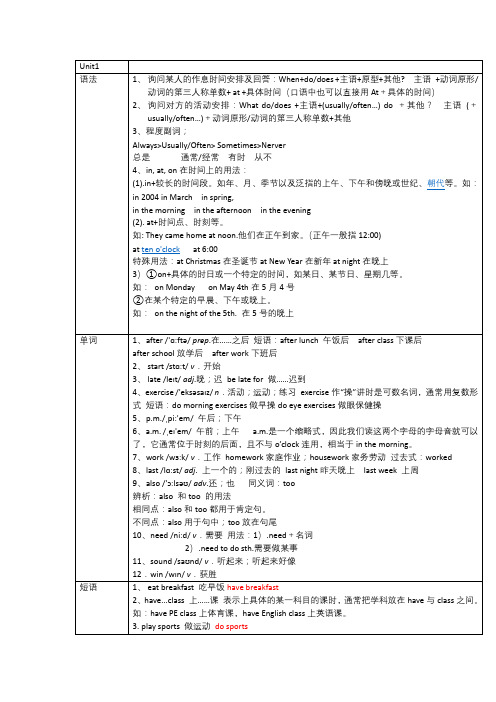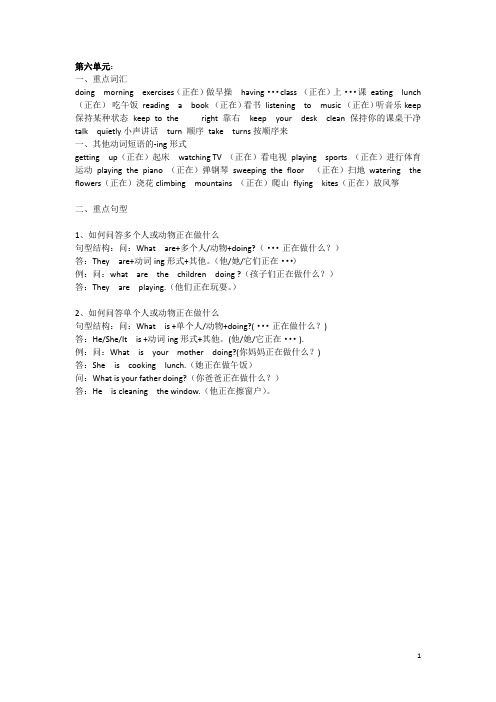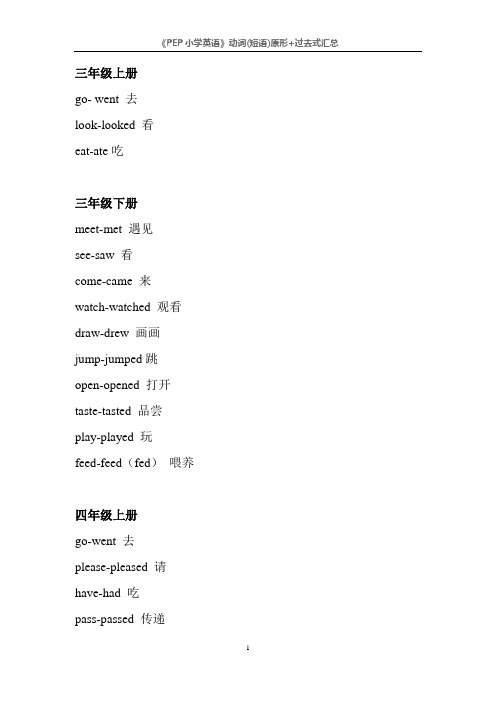PEP五年级下册动词短语
PEP五年级下册英语知识点整理

11、sound /saʊnd/v.听起来;听起来好像
12.win /wɪn/v.获胜
短语
1、eat breakfast吃早饭have breakfast
2、have...class上……课表示上具体的某一科目的课时,通常把学科放在have与class之间。如:have PE class上体育课,have English class上英语课。
on vacation度假同义词:holiday
4、lovely /lʌvli/adj.可爱的;美丽的
5、leaf /liːf/n.叶子复数:把leaf中的f变v,再加es,即leaves。
6、fall /fɔːl/v.落下n.秋天在美式英语中多用fall表示“秋天”,而英式英语
fall behind落后fall down落下
2、spring /sprɪŋ/n.春天在某个季节用介词in
summer /'sʌmə/n.夏天、跌势
autumn /'ɔːtəm/n.秋天in autumn在秋天early autumn初秋同义词:fall
winter /'wɪntə(r)/n.冬天
3.vacation /və'keɪʃn/n.假期summer vacation暑假winter vacation寒假
2、询问喜欢某个季节的原因:Why?/ Why do/does主语like、、、best?
Because….
because /bɪ'kɔːz/conj.因为用来连接表示因果关系的句子,后面跟表示原因的句子。
because of因为;由于+名词
ቤተ መጻሕፍቲ ባይዱ单词
【人教pep版】五年级下册英语:Unit 6单元知识梳理

第六单元:一、重点词汇doing morning exercises(正在)做早操having···class (正在)上···课eating lunch (正在)吃午饭reading a book (正在)看书listening to music (正在)听音乐keep 保持某种状态keep to the right靠右keep your desk clean保持你的课桌干净talk quietly小声讲话turn 顺序take turns按顺序来一、其他动词短语的-ing形式getting up(正在)起床watching TV (正在)看电视playing sports (正在)进行体育运动playing the piano (正在)弹钢琴sweeping the floor (正在)扫地watering the flowers(正在)浇花climbing mountains (正在)爬山flying kites(正在)放风筝二、重点句型1、如何问答多个人或动物正在做什么句型结构:问:What are+多个人/动物+doing?(···正在做什么?)答:They are+动词ing形式+其他。
(他/她/它们正在···)例:问:what are the children doing ?(孩子们正在做什么?)答:They are playing.(他们正在玩耍。
)2、如何问答单个人或动物正在做什么句型结构:问:What is +单个人/动物+doing?(···正在做什么?)答:He/She/It is +动词ing形式+其他。
(他/她/它正在···).例:问:What is your mother doing?(你妈妈正在做什么?)答:She is cooking lunch.(她正在做午饭)问:What is your father doing?(你爸爸正在做什么?)答:He is cleaning the window.(他正在擦窗户)。
【英语语法】《PEP小学英语》动词(短语)原形+过去式汇总

三年级上册go- went 去look-looked 看eat-ate吃三年级下册meet-met 遇见see-saw 看come-came 来watch-watched 观看draw-drew 画画jump-jumped跳open-opened 打开taste-tasted 品尝play-played 玩feed-feed(fed)喂养四年级上册go-went 去please-pleased 请have-had 吃pass-passed 传递use-used 使用四年级下册run-run 跑get up-got up 起床go to school-went to school 去学校go home-went home 回家go to bed-went to bed 上床睡觉wear-wore 穿put on-put on 穿上close-closed 关want-wanted想要take-took 买五年级上册know-knew 知道fun-funned 逗笑wait-waited 等待do homework-did homework 写作业watch-TV-watched TV 看电视read books-read books 看书play-computer-did housework 做家务cook the meals-cooked the meals 做饭empty the trash-emptied the flowers 浇花sweep the floor-swept the floor 扫地clean the bedroom-打扫教室wash the windows-washed the windows 擦窗户make the bed-made the bed铺床set the table-set the table 摆饭桌wash the clothes-washed the clothes 洗衣服do the dishes-did the dishes 洗碗碟put away the clothes-put away the clothes收拾衣服play chess-played chess 下棋tell-told 说work-worked 工作use a computer-used a computer 使用计算机have a try-had a try 试一试五年级下册do morning exercises -did morning exercises 晨练eat breakfast-ate breakfast 吃早饭have English class-had English class 上英语课play sports-played sports 进行体育运动eat dinner-ate dinner 吃晚饭climb mountains-climbed mountains 爬山go shopping-went shopping 购物go hiking-went hiking 去远足play the piano-played the piano 弹钢琴visit grandparent-visited grandparent 看望(外)祖父母fly kites-flew kites 放风筝plant trees-planted tress 种树make a snowman-made a snowman 堆雪人swim-swan 游泳skate-skated 滑冰sleep-slept 睡觉draw pictures-drew pictures 画画cook dinner-cooked dinner 做饭read a book-read a book 看书answer the phone-answered the phone 接电话listen to music-listened the music 听音乐clean the room-cleaned the room 打扫房间write a letter-wrote a letter 写信write an e-mail-wrote a letter 写电子邮件fly-flew 飞jump-jumped 跳run-ran 跑climb-climbed 往上爬fight-fought 打架swing-swang 荡秋千take-took 讲话drink water-drank water喝水send-sent 寄take picture-took pictures 照相watch insects-watched insects 观察昆虫pick up leaves-picked up leaves 采摘树叶do an experiment-did an experiment 做实验catch butterflies-caught butterflies 捉蝴蝶count leaves-collected leaves 收集树叶write a report-wrote a report 写报告play chess-played chess下棋六年级上册go to school-went to school 上学stop-stopped 停get to-got to到达find-found 寻找remember-remembered 记住mean-meant 意思是drive-drove 驾驶buy-bought 购买turn-turned 转弯get off-got off 下车ride a bike-rode a bike 骑自行车dive-dived跳水live-lived 居住teach-taught 教go-went 去play the violin-played the violin 拉小提琴make kites-made kites 制作风筝collect stamps-collected stamps 集邮design-designed 设计say-said 说六年级下册Think-thought 思考study-studied 学习kick-kicked 踢bounce-bounced 反弹go swimming-went swimming 游泳go fishing-went fishing 钓鱼study-studied 学习learn-learned 学习sing-sang唱歌dance-danced 跳舞row-rowed 划(船)go skiing-went skiing 去滑雪leave-left 离开hear-heard 听见trip-tripped 旅行have a fever 发烧hurt-hurt 疼痛have a cold-had a cold 伤风have a toothache-had a toothache 牙疼have a headache-had a headache 头疼have a sore throat-had a sore throat 喉咙疼。
人教PEP版五年级英语下册 Unit 1 My day 知识点清单

Unit 1 My day一、核心词汇1.动词: take 学习;上(课)2.名词: dancing跳舞;舞蹈exercise活动;运动3.短语: do morning exercises做早操eat breakfast吃早饭play sports进行体育运动eat dinner吃晚饭go for a walk散步go shopping去买东西;购物clean my room 打扫我的房间take a dancing class 上舞蹈课have … class 上……课二、了解词汇1.动词: start开始shop去买东西;购物work工作need需要live居住win获胜sound听起来好像2.名词: Spain西班牙play戏剧;剧本letter信island岛cave山洞;洞穴3.介词: after在(时间)后4.其他: when什么时候;何时late晚;迟 a.m.午前;上午p.m.午后;下午why为什么last上一个的;刚过去的also还;也busy 忙的5.拓展词汇——频率副词(1)定义: always, usually, sometimes等词叫作频率副词,用来表示动作发生的频率,但程度上有区别。
按频率大小可做如下排列: always > usually > sometimes(2)位置:频率副词一般放在主语之后、实义动词之前。
I always get up at 6:30. 我总是六点半起床。
I usually watch TV on the weekend. 我周末通常看电视。
(usually也可用于句首)I sometimes visit my grandparents. 有时我看望我的祖父母。
(sometimes也可以放在句首)6.短语:watch TV看电视eat lunch吃午饭go to bed上床睡觉go swimming去游泳 go home回家go to school去上学三、核心句型1.— When do you do morning exercises? 你什么时候做早操?— At 7 o’clock. 七点。
【口袋书】人教版PEP五年级下册英语 基础知识汇总

人教版PEP五年级下册基础知识汇总Unit 1 My day.重点单词:[四会]dancing 跳舞;舞蹈exercise 活动;运动take 学习;上(课)[三会]after 在(时间)后start 开始usually 通常地;惯常地Spain 西班牙late 晚;迟a.m.午前;上午p.m.午后;下午why 为什么shop 去买东西;购物work 工作last 上一个的;刚过去的sound 听起来好像also 还;也busy 忙的need 需要play 戏剧;剧本letter 信live 居住island 岛always 总是;一直cave 山洞;洞穴win 获胜重点短语:eat breakfast 吃早饭have … class 上…课play sports 进行体育运动do morning exercises 做早操eat dinner 吃晚饭clean my room 打扫我的房间go for a walk 散步go shopping 去买东西;购物take a dancing class 上舞蹈课go swimming 去游泳start class 开始上课last night 昨天晚上after lunch 午饭以后a lot of fun 许多乐趣live on an island 住在一座岛上be good at sports 擅长体育运动字母组合cl 发/kl/ 音:clean 打扫clock 钟class 课;班级clever 聪明的clock 钟字母组合pl 发/pl/ 音:plate 盘子;碟子eggplant 茄子please 请play 玩耍;戏剧重点句型:1.询问别人什么时候做某事的问句及回答:-- When do/does + 主语+ 动词(短语)原形(+ 其他)?-- 主语(+ 频度副词)+ 动词(短语)原形/ 第三人稀单数形式+ at + 具体时间/ At + 具体时间.-- When do you get up? 你什么时候起床?-- I get up at 5 o'clock. 我5点起床。
五年级下册英语pep版单词

五年级下册英语pep版单词Unit 1.- eat breakfast [iːt ˈbrekfəst] (v. 动词):吃早饭。
- have...class [hæv...klɑːs] (v. 动词):上……课。
- play sports [pleɪ spɔːts] (v. 动词):进行体育运动。
- exercise [ˈeksəsaɪz] (v. 动词 & n. 名词):锻炼;练习。
- do morning exercises [duːˈmɔːnɪŋˈeksəsaɪzɪz] (v. 动词短语):做早操。
- eat dinner [iːt ˈdɪnə(r)] (v. 动词):吃晚饭。
- clean my room [kliːn maɪ ruːm] (v. 动词短语):打扫我的房间。
- go for a walk [ɡəʊ fɔː(r) ə wɔːk] (v. 动词短语):散步。
- go shopping [ɡəʊˈʃɒpɪŋ] (v. 动词短语):去购物;购物。
- take [teɪk] (v. 动词):学习;上(课)- dancing [ˈdɑːnsɪŋ] (n. 名词):跳舞;舞蹈。
- take a dancing class [teɪk əˈdɑːnsɪŋ klɑːs] (v. 动词短语):上舞蹈课。
Unit 2.- spring [sprɪŋ] (n. 名词):春天。
- summer [ˈsʌmə(r)] (n. 名词):夏天。
- autumn [ˈɔːtəm] (n. 名词):秋天。
- fall [fɔːl] (n. 名词,fall = autumn):秋天。
- winter [ˈwɪntə(r)] (n. 名词):冬天。
- season [ˈsiːzn] (n. 名词):季节。
- picnic [ˈpɪknɪk] (n. 名词):野餐。
- go on a picnic [ɡəʊɒn əˈpɪknɪk] (v. 动词短语):去野餐。
PEP小学五年级英语下册知识清单

PEP小学五年级英语下册Unit 1 My day 知识清单【句型/语法知识点】一. 频度副词(放主语之后)。
always总是(100%); usually通常(80%); often 经常(60%);sometimes有时(30%);never从不(0%)二. 重点句型。
1. 询问别人什么时候做某事的句型及回答。
句型结构:问:When +助动词do/does + 主语(非三单/三单)+ 动原+ 其他?答:①主语(非三单)+(频度副词)+动原+ at + 时间点.例:问:When do you go to bed?答:I go to bed at 9:00p.m答:②主语(三单)+(频度副词)+动词三单形式(动词s/es)+ at + 时间点.例:问:When does Amy go to bed?答:She goes to bed at 9:00 p.m.2. 询问别人周末做什么的句型及回答。
句型结构:问:What +助动词do/does + 主语(非三单/三单)+ do + on the weekend?答:①主语(非三单)+(频度副词)+动原.例:问:What do you do on the weekend?答:I usually read books.答:②主语(三单)+(频度副词)+动词三单形式(即动词s/es).例:问:What does Amy do on the weekend?答:She often goes shopping with her mother .三.句型转换:1.肯定句↔一般疑问句:I usually get up at 6:00. ↔ Do you usually get up at 6:00?肯定回答:Yes, I do. 否定回答:No, I don’t.(第三人称时) He eats dinner at 6:00p.m. ↔ Does he eat dinner at 6:00p.m.?肯定回答:Yes, he does. 否定回答:No, he doesn’t.2.肯定句↔否定句:I like playing the piano. ↔ I don’t like playin g the piano.I can play the piano. ↔ I can’t play the piano.3.划线提问:⑴ I often go shopping on the weekend. → When do you go shopping ?⑵ I often go shopping on the weekend. → What do you do on the weekend?⑶ I go to school at 7:00. → When do you go to school?四. 语音:cl /kl/ clean clock class clever pl /pl / plate eggplant please playPEP小学五年级英语下册Unit 2 My favourite season 知识清单【四会单词】【重点句型】【句型/语法知识点】一. 重点句型1. 询问别人天气怎么样的句型及回答。
PEP小学英语五年级下册《Unit4+What+are+you+doing》第一课时教学设计_3

PEP五年级下册Unit4 What are you doing?第一课时一、教学目标与要求:1、知识与技能目标:能够听、说、读、写五个动词短语drawing pictures, doing the dishes, coo king dinner,reading a book,answering the phone;能够运用句子What are you doing ? 询问别人正在做什么,并用I’m doing the dishes/….来做答;通过说唱Let’s chant部分的歌谣巩固复习L et’s learn部分的动词短语和句子。
2、过程与方法目标:培养学生良好的英语学习策略和综合运用语言的能力。
3、情感态度与价值观目标:培养学生热爱做家务活的美好情感,增强学生生活的自理能力。
二、教学重、难点分析1、本课时需要重点掌握五个动词短语的ing形式,能够理解下一课时的主要句型“What are you doing?”并能用“I’m doing the dishes\……”作答。
2、针对本课时的难点之一,动词短语ing形式的读音,教师要多做示范,逐步引导学生流畅地连读。
三、课前准备1、教师准备各种动词短语的图片、卡片等。
2、教师准备小道具,如乒乓球(拍)、炒菜铲、碗碟、书、电话、画笔等。
四、教学步骤Step 1:Warm-upT: First,let’s enjoy a song together,ok?(播放Let’s chant歌曲)T: Do you like the song? Now,let's review. Please follow me. Do as I do.1.复习动词:(边做动作边说)eat/ drink/read/ write/ draw/ jump/ run/ swim(T: Wonderful! Let’s go on.)2.复习词组:take a photo / sweep the floor/ wash the clothes /do the dishes /cook the meals / read a book.(设计思路:在Warm-up 中通过TPR的形式回顾所学的动词,以旧带新,同时也为后面的新授、拓展做一简单的铺垫,目的就是从一开始就将学生带入动词的世界。
